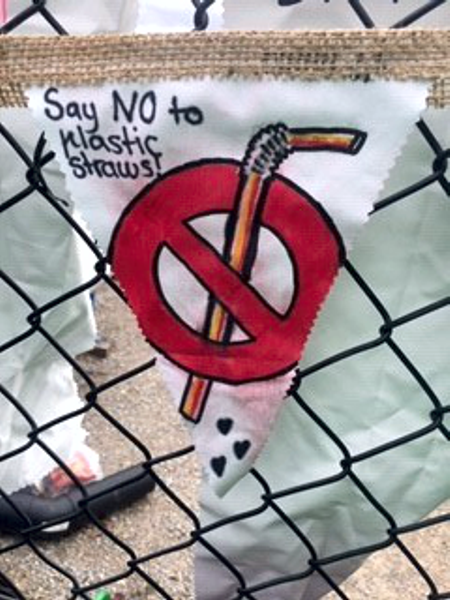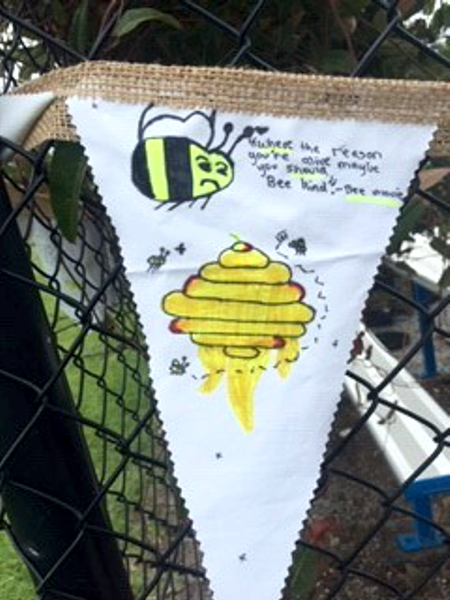Sustainability
Strathaird Primary School is committed to providing students with the knowledge, skills, attitudes and values necessary to shape a sustainable future. We believe that children will want to protect nature if they are involved in nature; playing, exploring and learning through nature. Building a love for and knowledge about our planet helps us want to care for it.
Resource Smart School
We monitor our Energy and Water usage through the SWEP program. You can view our real time data here;
Sustainability Curriculum
Students have Sustainability lessons once a week for two terms a year.
Preps participate in a lot of nature play activities focused on experiencing nature, playing outside exploring nature and learning about living things in our school. They also learn about waste, composting and recycling.
Grade 1s explore the animals and plants that living in our school and how we can care for them.
Grade 2s explore the vegetable garden in the unit ‘Kids in the garden’ learning to grow food, learn about plants and use food grown to cook.
Grade 3s explore water on our planet as a scarce resource and how they can conserve water. They enjoy exploring the health of the water in our frog pond. They also learn about energy, how it is made, its affect on the environment, sustainable alternatives and how to save energy.
Grade 5s learn about how indigenous Australians managed the land and what we can learn from them in the unit ‘Sacred Land’. They also learn about waste and how we can reduce it.
Grade 6s combine all their learning to create projects based on the United Nations Sustainable Development Goals.
Resource Smart School
We joined the Resource Smart program in May 2013. This program helps schools to take action in minimising their waste, save energy and water, promote biodiversity and reduce greenhouse gas emissions. We are a 5-Star school and have achieved 4 modules including CORE, Biodiversity, Water, Energy and Waste. We aim to continue our journey by continually striving for improvement and helping support other schools achieve RSS modules. For more information on the Resource Smart Schools Program please visit https://www.resourcesmartschools.vic.gov.au/about/
Our Green Team
Each year two representatives from each Grade 5 class are eligible to apply to be on the school’s ‘Green Team’. These are coveted positions and involve very important duties such as speaking at assembly, monitoring the school’s waste and recycling, brainstorming new environmental projects the school could implement, helping to maintain the vegetable garden, cleaning up litter in the yard and collecting each classes rubbish free points each week.
Rubbish Free Lunch
Biodiversity
We have worked hard over a long period of time to create a school with high levels of Biodiversity in both plants and the animals it attracts. We participate in Tree planting Day every year and continuously work on projects to increase our biodiversity such as building bug hotels, bird breeding boxes and lizard lounges.
Endangered eco-system garden
In 2009 the school constructed an endangered eco-system garden inclusive of a frog pond. This garden was designed in partnership with the local council and community groups to ensure that it would support endangered plants from the local area and encourage native fauna to thrive. Now in it’s 14th year of operation, the garden is a huge success. Staff, students and school community are encouraged to go down the endangered eco-system walk, complete with informative signage on our school and the garden itself. A variety of different animals have been spotted in this garden over time including noisy miners, rainbow lorikeets, heron and even an echidna.
Childrens Discovery and Sensory Garden
Our Children’s Discovery and Sensory Garden is located between our main teaching building, Eco cabin and the basketball courts. The Discovery Garden was designed as a garden for children to explore and interact with nature while encouraging biodiversity in our animal life. It includes a bamboo forest, scrambling rocks, water pump and creek bed and beautiful musical instruments. Our Sensory Garden is full of a diverse range of native plants that are both pleasing to the eyes and nose, as well as having some interesting textures for students to feel. Students can often be seen following the round-about style path through the sensory garden, touching and smelling their way through. These gardens provide endless play opportunities for children.
Waste
From 2018 to 2022, we were able to reduce the amount of waste we send to landfill by 112m3. We continue our efforts and reduce this further. Each classroom, staffroom and office area of the school has a green recycling bucket for mixed recycling, a paper recycling bin and a compost caddy. These strategies have significantly assisted us in reducing waste. We have 5 worm farms at the school and each Grade 2 class is able to further divert their waste by feeding the worms their scraps from fruit breaks once a week. We also have a number of food digester compost bins around the school. These allow us to compost all food waste generated in the school and the by products of this process fertilise the garden bed they are in.
Canteen plastic waste has been minimised by serving lollies in paper bags, changing from plastic to paper wrapped icypoles and composting food waste created by the canteen also diverts this food waste from landfill.
Our Sustainability Warriors program was introduced in 2017. Our Waste Warriors are responsible for checking their mixed and paper recycling bins for contamination as well as emptying these and food compost regularly and encouraging their peers to reduce their waste.
Water
At Strathaird every student is encouraged to bring a drink bottle full of water to school. We have also installed push-flow taps in all student toilets to ensure that these taps are not left on. Rain water is not wasted at Strathaird, we collect water of our Gym building roof that fills our 40,000L water tank, this water services all the toilets in the permanent buildings. We also have a smaller water tank which helps to water our other gardens and keep the frog pond topped up with water in drier months.We have water tanks in the Vegetable Garden for watering crops. Our new Eco Cubby and Eco Cabin also have rainwater tanks to utilise rainwater.
We joined the Schools Water Efficiency Program in 2014. This program helps us collect daily usage statistics and identifies us immediately of any water leaks.
Energy
We focus on Energy through our Energy Warriors. Each classroom has nominated two Energy Warriors. These warriors are responsible for ensuring that their lights and power points are switched off when they are not needed and that classroom temperature is set to energy efficient levels.
In addition to these roles our school is equipped with two energy-efficient classrooms. We also have a school-wide shutdown procedure that automatically shuts down all technology from 6pm onwards.
Each year we celebrated Earth Hour by switching off our classrooms for one hour, during this hour we saved a lot of energy and we encourage our families to also participate in earth hour. Despite our efforts our energy usage went up slightly from 2018-2022. We continue to investigate the causes of our increased energy use and will work on improving this result.







